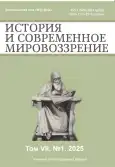Victories near El-Alamein and Stalingrad and their impact on the Middle East: 1942–1943
- Autores: Kuzmin V.A.1
-
Afiliações:
- Ural Federal University named after the First President of Russia B. N. Yeltsin
- Edição: Volume 7, Nº 1 (2025)
- Páginas: 142-148
- Seção: DEBATING ISSUES OF GENERAL HISTORY AND INTERNATIONAL RELATIONS
- URL: https://bakhtiniada.ru/2658-4654/article/view/292457
- DOI: https://doi.org/10.33693/2658-4654-2025-7-1-142-148
- EDN: https://elibrary.ru/IUHLAQ
- ID: 292457
Citar
Resumo
The article highlights the question of how the military actions in 1942-1943 on the Soviet-German front and in North Africa were perceived in the countries of the Middle East, which were objects of the aggressive aspirations of the powers of the fascist Axis — Germany and Italy. This topic is poorly studied in Russian historiography. Meanwhile, the study of how the victories won by the Red Army at Stalingrad and the armed forces of the British Empire at El Alamein were perceived in Turkey, Iran and the Arab countries of the Middle East is not only an interesting and important, but also an urgent scientific task, since at that time the countries of this region were not considered on the world stage. as much as they are independent entities (Turkey to a lesser extent, Iran and the Arab countries to a greater extent), as they are objects of the policy of the great powers. Based on the analysis of the sources used, in particular, documents from the Political Intelligence Department of the British Ministry of Foreign Affairs, the reaction of the ruling circles, representatives of various political forces, the public, the press of Turkey, Iran, Egypt, Iraq, Palestine, Syria, Lebanon, Transjordan, Saudi Arabia to the course of military operations in North Africa, on the Soviet-German border is shown. at the front and their result in the period under review. It is concluded that the content of the studied British documents proves that the political forces, the public, and most residents of Middle Eastern countries understand the leading importance and determining role of events on the Soviet-German front and the victories of the Red Army for their future fate after the war.
Texto integral
##article.viewOnOriginalSite##Sobre autores
Vadim Kuzmin
Ural Federal University named after the First President of Russia B. N. Yeltsin
Autor responsável pela correspondência
Email: kuzmin16@yandex.ru
ORCID ID: 0000-0002-8935-3085
Código SPIN: 8601-7851
Researcher ID: HCI-7063-2022
Dr. Sci. (Hist.), Professor, Honored Worker of Higher School of the Russian Federation, Professor of the Department of Oriental Studies of the Ural Institute of Humanities
Rússia, YekaterinburgBibliografia
- Head-to-head courses: The policies of the USSR and the USA in the Balkans, the Near and Middle East in 1939–1947. Kirov: Vyatka State University for the Humanities, 2014.
- Yeremeyev D. E. Turkey during the Second World War and the Cold War (1939–1990). Moscow: Academy of Humanitarian Studies, 2005.
- Orishev A. B. The Iranian Knot. Moscow: Veche, 2009.
Arquivos suplementares








